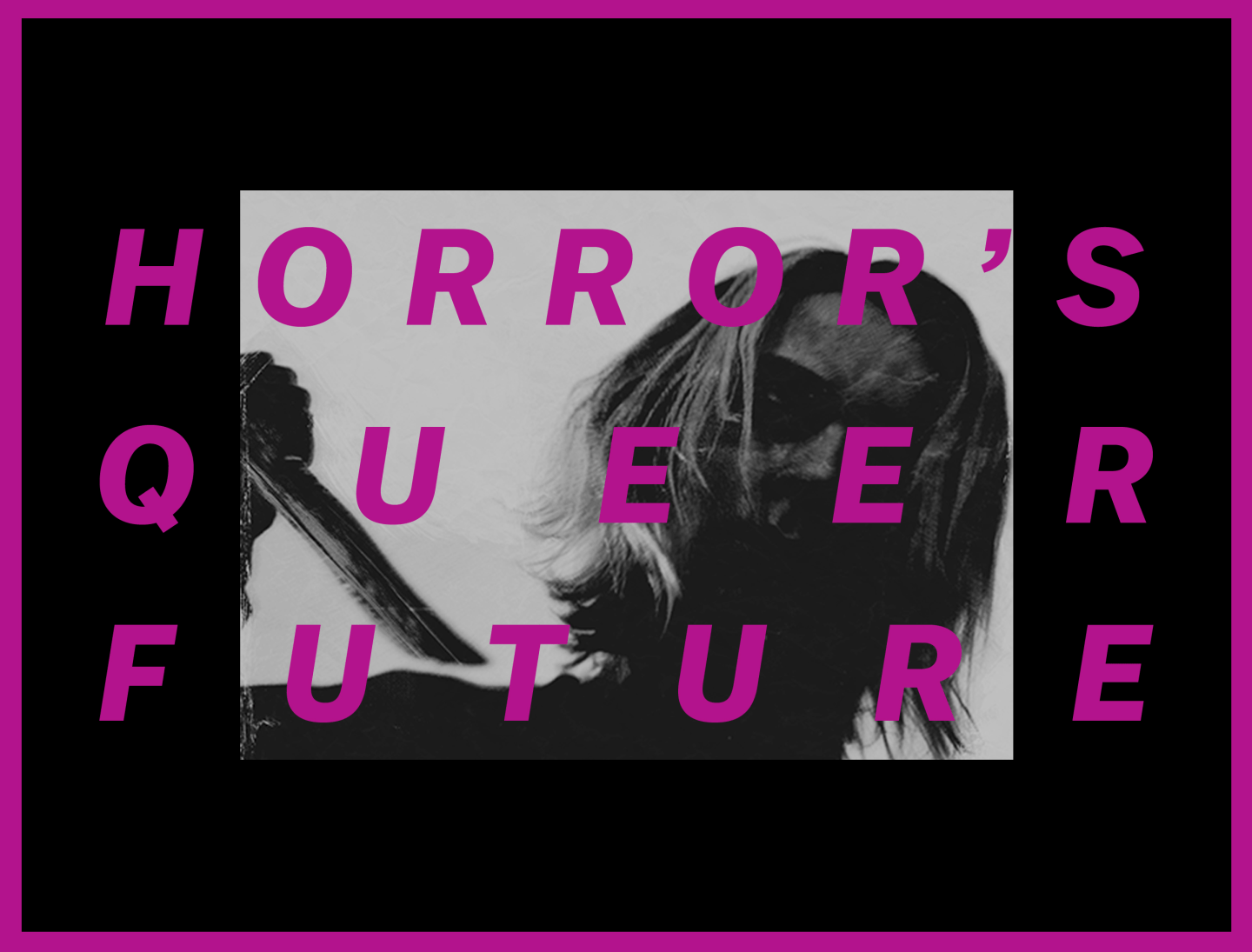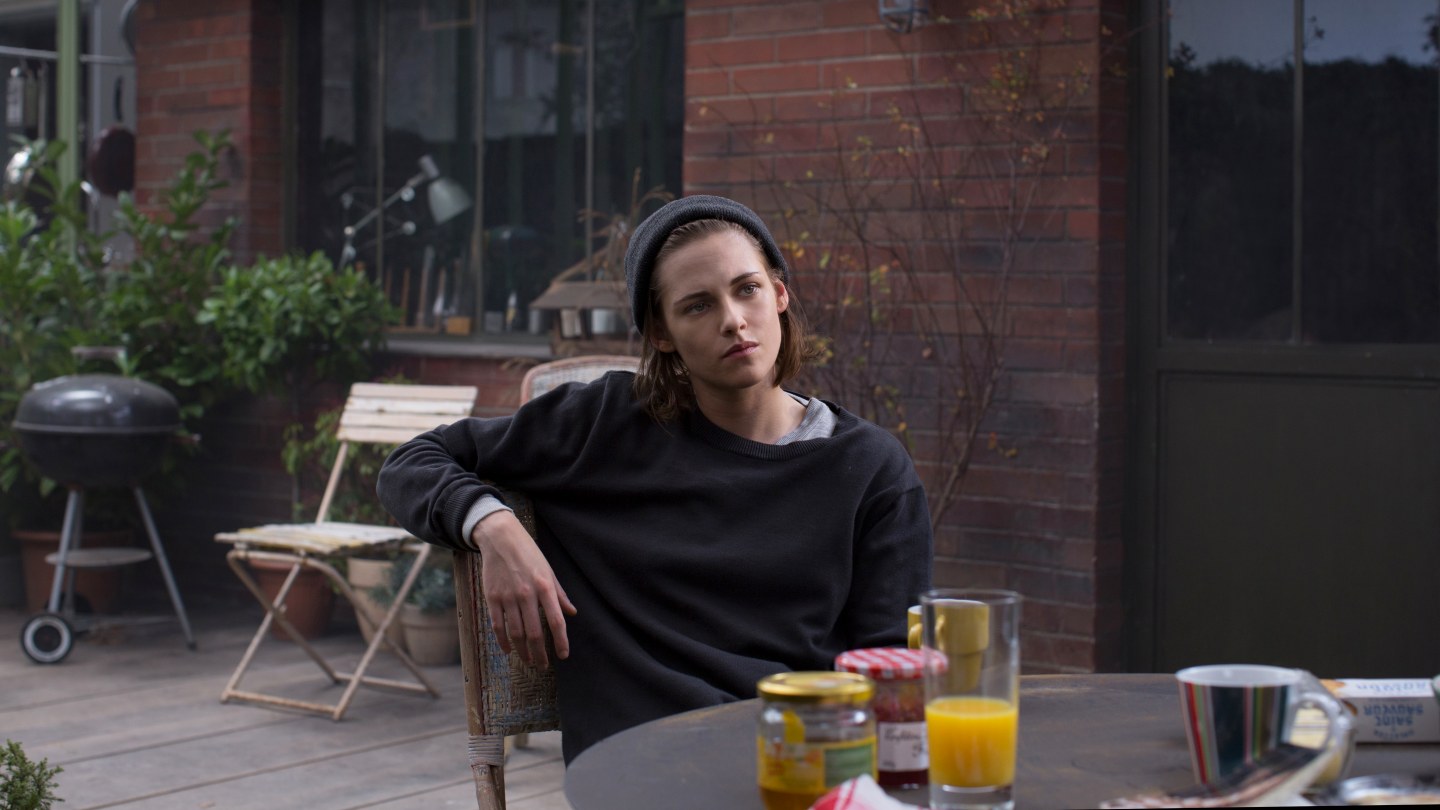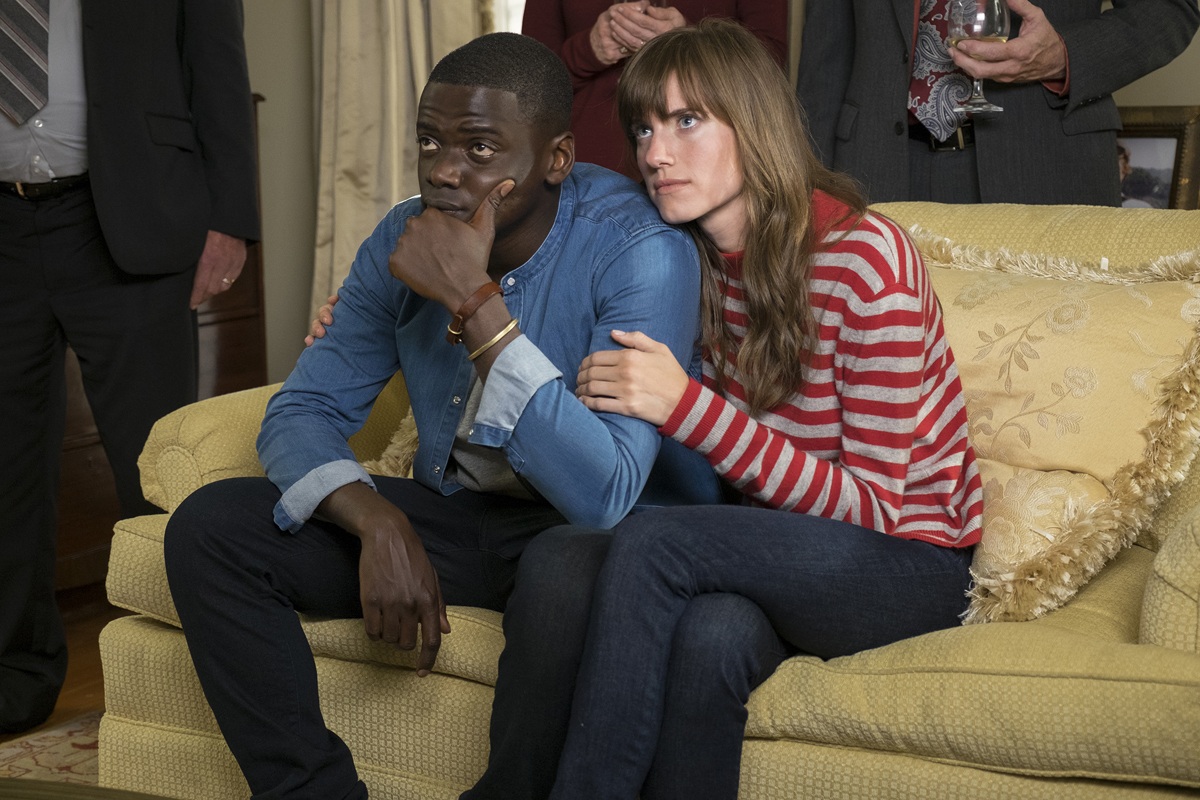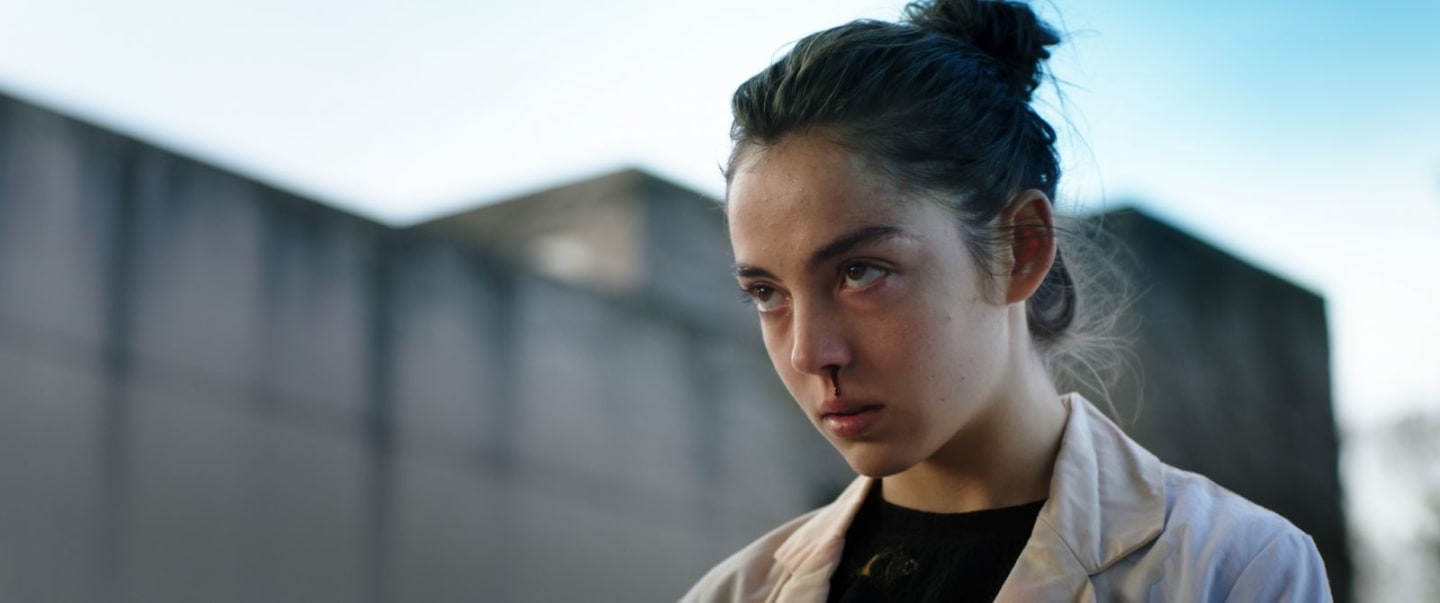
There was a time when queer horror barely existed. Now the genre not only exists, but it's flourishing. Four of 2017’s talked-about movies are welcome additions to the expanding canon of queer horror titles.
A horror can be queer in many ways. Explicit onscreen non-straight action isn’t required, and neither are heavily coded gay themes. Often simply having a major queer player involved adds a welcome texture, be it an out screenwriter (Sebastian Silva's conniving tourism-horror Magic Magic), director (Kimberley Peirce's ruined-by-studios Carrie remake), or actor (Neil Patrick Harris as Rosamund Pike’s doomed ex in Gone Girl). This writer or director or star can give their movie an extra oomph of queer sensibility — camp, self-awareness, and, sometimes, painful real-life subtext.
Personal Shopper, Olivier Assayas’s experimental ghost story, doesn't give a shit about connecting any dots (see: a random slasher scene that goes largely unsolved). But it ultimately excels with a totally fluid mystery-horror mood, a sluggish calm tightened by unease. What seems to cement this specific tone is the presence of our star, Kristen Stewart, who plays a spiritually traumatized assistant with a thing for dressing up in her celebrity boss’s clothes.
 Kristen Stewart in Personal Shopper.
IFC Films.
Kristen Stewart in Personal Shopper.
IFC Films.
Stewart’s an interesting challenge for viewers in 2017: she's now pretty much only appearing in niche pictures by the likes of Kelly Reichardt and Ang Lee, and she's recently officially openly gay. Both factors indicate a shift away from the bland billionaire star she was generally perceived as during her Twilight come-up. Now any time you see her in paparazzi pictures, she's deliberately coy or androgynous, gripping another woman’s hand, smirking at how you will never understand her. She’s a sphinx, unable to be categorized, and she’s putting that mystery into her starring roles. Personal Shopper is all the better for it.
Sometimes in a horror film, straight protagonists encounter queerness in a suspenseful frame. It jars the audience beyond a typical scare; you’re meant to connect queer identity with “otherness” and, subsequently, fear. Let’s call this “homo-as-horror.”
Dating back to ancient queer horror beginnings, “homo-as-horror” reared its ugly head in Rebecca, The Haunting, and even A Nightmare On Elm Street 2: Freddy’s Revenge . Sometimes the homo-as-horror is used to expose homophobia, like in American Psycho, when Patrick Bateman is so visibly disgusted by gay Luis Carruthers that he can’t even kill him; the audience laughs at Bateman’s sad prejudice. But most often, as in 2013’s Insidious: Chapter 2, when a homicidal villain is revealed to be a shrieking man apparently driven mad by his gender confusion, it’s just flat-out queer-phobic.
 Daniel Kaluuya and Allison Williams in Get Out.
Universal Pictures.
Daniel Kaluuya and Allison Williams in Get Out.
Universal Pictures.
Get Out, Jordan Peele’s excellent, records-breaking 2017 social thriller, uses homo-as-horror in the blink of an eye. (Warning: spoilers ahead). As we near the film’s climactic final act, we learn that man-eating white girl Allison Williams has not only brought home and brainwashed men of color, but at least one woman, too. It’s revealed in the quick and blunt flash of an uncovered photograph, and the score swells up, as if to say: "A girl! This even goes THAT far!" But Get Out ultimately slides to safety, using horror-as-homo in a new, cheeky way. In the context of a movie as smart and joyfully progressive as this one, the moment actually feels inclusive.
There’s a specific subgenre of horror bursting with films that take place inside the walls of a strict, usually religious, all-girls boarding school. These Girls Boarding School films, usually made queer by underlying same-sex tension, hit a peak in 1994, when a dowdy Melanie Lynskey and a manic Kate Winslet brutally murdered Lynskey's character's mom in Peter Jackson's Oscar-nominated, true-crime-inspired Heavenly Creatures. But there are more recent examples, too: Juno Temple beat Eva Green's queer lover to death in Cracks; Patricia Clarkson starred as an evil headmistress in The Woods; and then, the subgenre found a modern gothic vampire home in The Moth Diaries, director Mary Harron's dead-on-arrival secret camp classic.
Indie films hold the gauntlet in queer horror, twisting tropes and prioritizing inclusivity. But what’s mainstream horror offering?
Full of monsters and matriarchs, movies in the GBS canon are melting pots of lesbian experimentation. The Blackcoat's Daughter, director Oz Perkins’s recent, long-gestating wintry horror starring Emma Roberts and distributed by Moonlight production house A24, is a modern take on the subgenre, with surprisingly mainstream leads. After getting possessed by Satan in a boiler room, Kiernan Shipka, best known as Sally Draper on Mad Men, proceeds to stalk Sing Street’s Lucy Boynton. Shipka’s character makes a point of disturbing other girls with her devilish new identity, often growling, "You smell pretty." With almost zero men around, The Blackcoat's Daughter is a great example of how the Girls Boarding School horror always becomes less about its premise and more about the dangers of containing teen hormones to strict quarters.
Raw is the most outwardly queer of this year’s entries, since this French-language film about cannibalism gives LGBTQ+ identities the most screen time. It’s nestled nicely in a category we can call “The Token Gay,” which is when a script uses tokenism for good, injecting the usual narrative with an out character who strives to survive just like everyone else. Utilized notably in several ’90s and post-’90s teen slashers (The Faculty, Bride of Chucky, Cursed) thanks to queer filmmakers, The Token Gay appeared again this year, in Raw.
Our innocent hero Justine, played by Garance Marillier, lands in vet school, where she is hazed relentlessly by her sister and older peers. She also meets Adrien, her assigned roommate and eventual best friend. Adrien is queer, and he flaunts his sexuality in Justine's face, bringing guys home to her chagrin. His hookups are important to Raw’s plot not because they're of the homosexual variety, but because he's brazenly loud and unselfconscious — everything Justine is not. But her repressed urges ultimately manifest in gory ways, revealing Raw's true woman-as-monster feminist bent, a theme tackled most famously in the original Carrie and 2000’s puberty parable Ginger Snaps. In this context, the Token Gay doesn’t feel at all exploitative; it’s a case of proud, onscreen representation. It’s something we need more of, in any genre.
 Garance Marillier in Raw.
Petit Film/ Rogue International.
Garance Marillier in Raw.
Petit Film/ Rogue International.
For now, indie films hold the gauntlet in queer horror, twisting tropes and prioritizing inclusivity. But what's mainstream horror offering? I mean, we have Jennifer Jason Leigh's eighteenth Amityville franchise entry coming this June, packed with trash. As an unintentionally hysterical sequel with an Oscar nominee, I suppose its high camp level might qualify as queer horror. A very feminist and inclusive-seeming Alien: Covenant approaches, too, as do two queer-starring remakes: Ellen Page in a Flatliners update (stomach-churning), and Tilda Swinton as headmistress in the anticipated reimagining of Dario Argento's Girls Boarding School masterpiece, Suspiria (uh, wow).
While mainstream horror’s queer representation still has work to do, the four big, notable queer horror releases in this year’s first four months indicate that the future for the genre is bright. For all we know, right now in pre-production, there could be a $6 million “spiritual thriller” starring Jesse Eisenberg and Jesse Eisenberg as gender-nonconforming identical twins on “a surreal road trip” intercut with unexplained shots of our entire solar system very slowly going black, and arthouse crowds wouldn’t even blink.
As new films bring positive views of layered sexuality to horror, the genre also attracts more unique and high-quality filmmakers, which results in better movies. Production companies and distributors seem to be less conservative now, too. They take risks on creators who shade their films with queerness, and viewers’ eyes open wide. The moviegoer who rejects today’s widespread close-mindedness is seeking out films that serve both as shelter, and as badges of pride. We’re hungry for new movies that exist outside the norm. Finally, it seems, our requests are starting to be fulfilled.